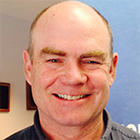Educational Background:
- Bachelor’s Degree in Computer Science from the University of California, Davis
- Master’s Degree in Civil Engineering the University of California, Davis
- Courses in Meteorology from Penn State University and Mississippi State University
Describe the career path that led you to your current job with the National Weather Service.
- The first ten years of my career were with the US Army Corps of Engineers, first as a software engineer and then as a hydraulic engineer. I then accepted a job with the NWS as a Service Hydrologist. I quickly fell in love with the mission of the NWS and began the process of becoming meteorologist qualified by taking courses online. This allowed me to become a Warning Coordination Meteorologist (WCM) and then a Meteorologist-in-Charge (MIC), the position I hold now.
What do you do for the NWS?
- I have the pleasure of providing leadership and support for 22 staff members so that they can accomplish the NWS’s important mission. I do this by ensuring that everyone feels like they are part of something larger than themselves, that they feel valued for their contributions, and that they have the resources and support they need to get their job done. I also ensure that our team has a shared vision for the future and that we are aligned with the NWS’s vision.
What was the most interesting, exciting, or impactful weather/water event you experienced while working for the NWS and why does it stand out?
- The 2005 flood and high wind event. We had a bent-back occluded front that produced straight line winds well over 100 mph. The thing that stood out for me is that these winds blew across bays and rivers and were so strong that they were able to cause a significant wave set-up on the water surface that resulted in flooding in areas that normally don't flood. I happened to be monitoring a river near its mouth for tidal influences so, just by luck, I was able to directly measure this impact.
What made you decide to pursue a career with the NWS?
- I was already working for the NWS when I decided to pursue a career with the NWS. I was conducting a tsunami evacuation drill and there was a little girl walking up the evacuation route with her go bag on her back. She was enjoying the exercise but was also taking it very seriously. I will never forget that little girl. Later, when I heard from community members that the drill had made them feel safer than they had felt in years, I was hooked. I've never looked back.
What do you like most about working for the NWS?
- The NWS is incredible because the work is enjoyable, stimulating, and challenging and the bonus is that this work has so much positive impact on the people and communities we serve. I'm frequently reminded of this because when I'm out in the community with my NWS shirt on, people stop me to express appreciation for what the NWS does. It is this dual nature of the job that makes me excited to come to work every day.
What advice do you have for someone interested in a career with the NWS?
- Learn all you can about the NWS to determine what kinds of jobs are available and then look to see if there are some that align with your talents, interest, and values. For the first part of this recommendation, visit offices and talk to people in those positions to get a clear picture of what the work is like. For the second part of that recommendation, be very honest with yourself. Lastly, be flexible. Let your career aspirations evolve as you move through school and your career.
What training or coursework would you recommend to someone interested in following your career path?
- The obvious coursework for my career path is math, computer science, and physics followed by specific courses in meteorology or hydrology. But it's important to note that much of the work at a WFO depends on such skills as understanding how people make decisions regarding hazards, how to communicate to a diverse audience, and how to work to prepare communities for the hazards they face. Therefore, a broad background, beyond the physical sciences, is very helpful.
